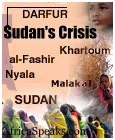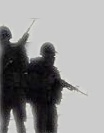 |






 AfricaSpeaks Weblog AfricaSpeaks Weblog
 Rootswomen Weblog Rootswomen Weblog
 Rootsie's Weblog Rootsie's Weblog
|
Georgia continues to distance itself from Russia
Posted: Thursday, December 26, 2002
by Matthew Riemer and Erich Marquardt
(PINR) -- Georgian President Eduard Shevardnadze is scrambling for recognition. But he's not looking towards his neighbor to the north -- Vladimir Putin and the Russian Federation. Instead, Shevardnadze, perhaps more than a touch intimidated by recent dealings with Moscow, is looking to NATO and the United States.
On November 21st, Shevardnadze announced Georgia's interest in formally applying for NATO membership, albeit admitting that his country still has a few years of development ahead before formal admission.
Shevardnadze also recently met with General Richard B. Myers, U.S. Joint Command Chief, so the two could discuss Georgian security and the progress of the U.S.' "Train and Equip Program" currently being carried out in Georgia. The program was designed to train the weakened Georgian military in anti-terrorist measures in the wake of the attacks on the World Trade Center and Pentagon in September 2001. Myers sees the program as eventually paving the way for Georgia's NATO membership.
Georgia is currently dealing with separatist, ethnic minorities in Abkhazia to the northwest and South Ossetia in the north central part of the country. Both regions enjoy de facto independence due to the disrepair and ineffectiveness of the Georgian military. Substantial evidence also indicates Moscow's hand when evaluating the strength and resilience of the separatists.
Diplomatically, Tbilisi is also experiencing problems in the Pankisi Gorge, a rugged region near the Chechen border, which Moscow claims to be a safe haven for Chechen guerrillas. It is this gorge and, more precisely, the tensions and rhetoric that surround it that pose the greatest threat to stability in the region.
Citing the troublesome Pankisi, Vladimir Putin on several occasions has threatened to send Russian troops into Georgia to eradicate such rebel sanctuaries. But clear signals have come from Washington that this would not be accepted and would be a violation of Georgian sovereignty.
Shevardnadze still fears that, if Russian forces enter the Pankisi Gorge and engage in serious fighting, they could then demand to remain, bolstered by further claims of alleged Chechen hideouts. Moscow could then seize the opportunity and attempt a slow, de facto occupation of northern Georgia. Yet, as long as there are U.S. military personnel in Georgia, nothing of the sort will happen. One can only imagine the ramifications of an intelligence mistake or "friendly fire" incident that might unexpectedly and suddenly pit Russian forces against Georgian troops and their U.S. counterparts.
The presence of the Baku-Tbilisi-Ceyhan oil pipeline, which is still under construction, also makes maximum Georgian security vital to the U.S. and the foreign investors they now represent. Official forays by Russian troops into Georgian territory to fight a protracted, low-intensity conflict would be unacceptable to Georgia, the United States, and the business community invested there.
Moscow is increasingly frustrated by the presence of U.S. forces in Georgia, which effectively prevent Russian troops from entering the Pankisi Gorge in earnest for anti-terrorist measures. They are also frustrated by Washington's lack of acknowledgment of their own terrorism problem, a problem in which they feel Georgia and Shevardnadze are a part. This frustration has translated itself into a desire on Moscow's behalf for instability, if not chaos, in Georgia. Indeed, recently, Georgian officials expressed their beliefs that this is exactly Moscow's desire -- to create enough instability and unpredictably in Georgia so as to effectively deter both foreign interest and investment, therefore decreasing Washington's involvement and providing a pretext for Russian action.
Washington desires just the opposite: stability in Georgia and surrounding Azerbaijan and Armenia. This achieves many goals in the eyes of policymakers: a burgeoning resource rich region will be able to fully realize its production and transport capabilities; Moscow will be prevented from attempting to 'take back' Georgia on the pretext of general instability and the harboring of terrorists; and an additional military foothold will be established in the region, which is on Iraq and Iran's doorstep.
Facing this option, Tbilisi has chosen to side with their Western allies and financiers. Shevardnadze wants U.S. forces to remain, wants FDI (foreign direct investment) to continue to flow into his country, and now wants to become part of NATO. In short, he wants Georgia to be of great concern to the West. As these aims continue to be met, he is ensuring that his struggling country is less threatened by a Moscow with strong imperialist aspirations in the Southern Caucasus.
 Printer friendly version Printer friendly version
 Send page by E-Mail Send page by E-Mail
|








